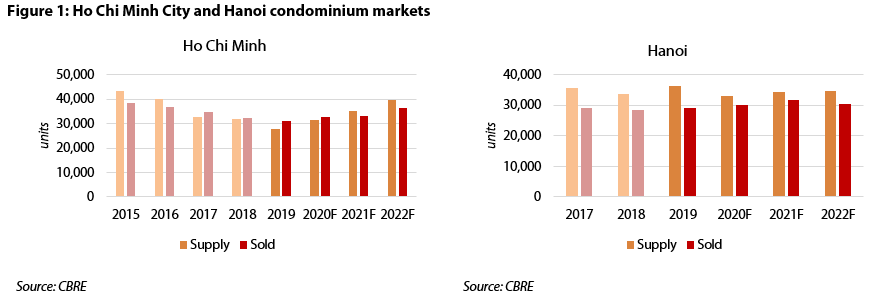Covid-19 exerts insignificant impacts on Vietnam residential market in short term
The situation, however, is likely to be getting worse if the pandemic derails the economy, due to the highly cyclical nature of the real estate industry.
Although Vietnam’s economy is under huge pressure from the Covid-19 pandemic, especially in industries related to trade and transportation, the impact on the residential market is not clear in the short term as demand depends on the homebuyer’s long-term plan, according to Viet Dragon Securities Company (VDSC).
However, the situation is likely to be getting worse if the pandemic derails the economy, due to the highly cyclical nature of the real estate industry. Moreover, the percentage of buyers investing and speculating in projects in Vietnam is also relatively high, leading to the negative sentiment, said VDSC in its latest report.
The bright spot is recent positive news, which should help the market partly solve the “legal bottlenecks.”
Thereby, it will help increase supply to the market. In addition, investors also expect the stimulus package in 2020 to support the economy, especially the implementation of public investment projects, which strongly support real estate demand. Real estate developers in general will benefit from this trend. It is also considered an opportunity for good companies with healthy cash flow to capture more market share.
Specifically, Decree No.25, which allows land to be allocated to winning bidders immediately after completing the compensation process, is expected to facilitate the resumption of a number of infrastructure projects. Recently, the Ho Chi Minh City People’s Committee announced that it will re-start a number of infrastructure projects in the Thu Thiem New Urban Area, while there has been progress in major infrastructure projects likes Long Thanh airport and Bien Hoa-Vung Tau expressway.
A look at real estate market in 2019 and 2020
2019 closed with the lowest amount of supply during the last five years in the Ho Chi Minh market, down 16% year-on-year, while Hanoi launched the highest number of units in the last three years, up 7%. The difference between the two key markets is that the absorption rate in Ho Chi Minh has been higher than in Hanoi, as it was the third consecutive year that demand exceeded supply, contrary to the Hanoi market.
In 2020, CBRE predicted a 15% increase year-on-year in the supply in the Ho Chi Minh City market, thanks to the expectation of loosening legal processes. Meanwhile, the Hanoi market will suffer a decline of 17%, due to the reduction of supply from large-scale projects of developer Vinhomes.













